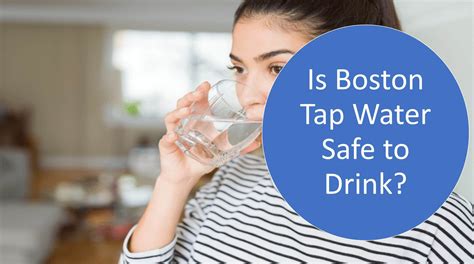The quality of tap water in Boston has been a subject of concern for residents for many years. In 2022, the Boston Water and Sewer Commission (BWSC) released a report showing that the city’s tap water meets all federal and state drinking water standards. However, the report also showed that the water contains some contaminants, including lead and copper.

Contaminants in Boston’s Tap Water
The BWSC report found that the following contaminants were present in Boston’s tap water:
- Lead: Lead is a toxic metal that can cause a range of health problems, including learning disabilities, developmental delays, and kidney damage. The BWSC report found that the average lead level in Boston’s tap water was 5 parts per billion (ppb). This is below the federal action level of 15 ppb, but it is still higher than the recommended level of 0 ppb.
- Copper: Copper is another toxic metal that can cause a range of health problems, including liver and kidney damage. The BWSC report found that the average copper level in Boston’s tap water was 1.3 ppm. This is below the federal action level of 1.3 ppm, but it is still higher than the recommended level of 0.2 ppm.
- Other contaminants: The BWSC report also found that Boston’s tap water contains a number of other contaminants, including trihalomethanes, haloacetic acids, and disinfection byproducts. These contaminants are all regulated by the federal government, and the levels found in Boston’s tap water are below the allowable limits.
Health Effects of Drinking Boston’s Tap Water
The health effects of drinking Boston’s tap water are not fully known. However, the presence of lead and copper in the water is a concern. Both of these metals can cause a range of health problems, especially in children.
If you are concerned about the health effects of drinking Boston’s tap water, you may want to consider using a water filter. Water filters can remove lead and copper from the water, making it safer to drink.
How to Reduce Your Exposure to Contaminants in Boston’s Tap Water
There are a number of things you can do to reduce your exposure to contaminants in Boston’s tap water:
- Use a water filter: Water filters can remove lead and copper from the water, making it safer to drink. There are a variety of water filters available, so you can choose one that fits your needs and budget.
- Let the water run for a few minutes before drinking it: This will help to flush out any lead or copper that may have built up in the pipes.
- Use cold water for drinking and cooking: Lead and copper are more likely to leach into the water from hot water pipes.
- Avoid drinking water from public fountains: Public fountains are not regulated by the federal government, and the water may not be as clean as the water from your tap.
- Get your water tested: If you are concerned about the quality of your tap water, you can get it tested by a certified laboratory.
Conclusion
The quality of tap water in Boston is a complex issue. The water meets all federal and state drinking water standards, but it does contain some contaminants, including lead and copper. The health effects of drinking Boston’s tap water are not fully known, but the presence of lead and copper is a concern. If you are concerned about the health effects of drinking Boston’s tap water, you may want to consider using a water filter.
FAQs
1. Is tap water in Boston safe to drink?
Yes, tap water in Boston meets all federal and state drinking water standards. However, the water does contain some contaminants, including lead and copper. The health effects of drinking Boston’s tap water are not fully known, but the presence of lead and copper is a concern. If you are concerned about the health effects of drinking Boston’s tap water, you may want to consider using a water filter.
2. What are the contaminants in Boston’s tap water?
The contaminants in Boston’s tap water include lead, copper, trihalomethanes, haloacetic acids, and disinfection byproducts. The levels of these contaminants are all below the allowable limits set by the federal government.
3. How can I reduce my exposure to contaminants in Boston’s tap water?
You can reduce your exposure to contaminants in Boston’s tap water by using a water filter, letting the water run for a few minutes before drinking it, using cold water for drinking and cooking, and avoiding drinking water from public fountains.
4. Where can I get my water tested?
You can get your water tested by a certified laboratory.
